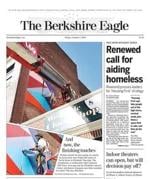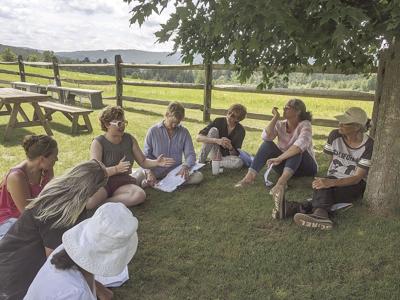In 2017, Tyringham community members performed Thornton Wilder’s "Our Town," under the direction of Ann Gallo, UBU Theater founder and director. It was a hit. Kerry Clark Sullivan, who grew up in Tyringham, but no longer lives there, said she was “blown away” by seeing it. Right away, people were talking about doing another play.
But which one?
One day, Gallo saw a stack of cassette tapes while at a meeting in the former schoolhouse. She asked what they were. She started to transcribe them and was amazed that of the 60 oral history recordings, only six were of women. The next play was inspired by that discovery. But, this time, in addition to producing and directing the play, she would write it, too.
So, she interviewed 32 women, and together with Rachel Urquhart, also of Tyringham, wrote a play using those conversations. Clark Sullivan is now running lines with her husband every night: She has become part of a new tradition. She said she is hearing for the first time the sorrows and joys of women in town, sometimes around events that may have been generally known — like a big fire — but were dealt with privately.
Editor's note: The following is a conversation between Judy Monachina and Ann Gallo about "Women of Tryingham: An Original Oral History Theater Project." The oral history project is described as an "overdue exploration and celebration of Tyringham’s women." It reflects stories from similar rural towns where women’s voices have been tucked away for generations.
Q: Ann, what is community-based theater?
A: It’s not community theater. I would define it as curating a community and engaging the community in a very slow trust-building process. The project I did, "Our Town," back in 2017, took about a year for folks to kind of come around and trust me, because you’re vulnerable if you’re going onstage or you’re doing something for the first time. When it works, and people become engaged, it’s an incredible thing, and I’m already seeing it with this project.
Q: You had experience with community-based theater?
A: After my kids started leaving the house and going off to school, I got a master’s in theater education. So, that gave me the tools and the courage to do it.
After "Our Town," everyone was psyched. We did a play; let’s do another one. There’s this little town in Italy, Monticchiello; every August they write their own play, and they’ve been doing this since the 1960s. One of their first plays was about World War II, and I showed that film at the church. I said, “Someday, we’re going to do something just like this.”
Q: So, you interviewed these women. You have 32 interviews. You have interview transcriptions; a lot of pages of talk. What did you do next?
A: Then Rachel Urquhart and I read through everything. We had two copies of all the transcripts, and we would circle if it was a line, if it was a character description, if it was a full-fledged story. Then, we would read them to each other, because you have to hear them out loud.
We started making piles. This entire living room: this was the farming pile, this was the character pile, this was the funny-line pile. That was the mother pile. That was the father pile. That was the farming pile. That was the death pile. That was the community pile.
Q: You circled parts of the transcripts, cut those pieces out, and put them in piles?
A: Yes. We spent hours in there every day for probably a month just piecing it together.
I had just gone to London, the British Library, to do a workshop on how to take text to script. In the middle of it, the guy goes, “All right, I’m going to hand out these transcripts, and you have a half-an-hour to write a scene based on this stuff.” This was handwritten, no laptops. Then, we all read each other’s scenes.
So that was just a fish-or-cut-bait moment. I said [to Rachel], “Okay, stop. We have to stop making piles. We now have to start writing. You and I are going to go in that kitchen and we’re going to sit down. Here’s a piece for you, and here’s a piece for me, and we have a half-an-hour, and we’re just going to start writing a scene.” Both of those scenes are still in the play.
Q: At then some point, you knew it was a script. It was a thing.
A: It was a thing, and it ended up being the categories, mothers and relationships with mothers and fathers, and marriage, and going to school. We refer to them as those categories still, the scenes.
Q: Can you talk about the setting?
A: The third act of "Our Town" took place in the field behind the Union Church. There is this corner with a beautiful perfectly round tree ,where you can see the schoolhouse. You can see the hills. You can see a farm up here, and then you can see the Cobble. The center of town is that Cobble right there [pointing to her window].
I’ve made a thrust stage, thanks to Corinna May (Shakespeare & Company). She recommended it for non-actors, who are not used to throwing their voices. Typically, if you have a thrust, the audience is around three sides. There’s a beautiful split-rail fence. It’s just iconic of the town and the agricultural history here.
There are some scenes, there are some monologues, 20 characters, so there’s a lot of actors crisscrossing.
Q: You mentioned many people had favorite places. What was a favorite place?
A: There was Baldy, which is no longer Baldy, and I went to the dump Wednesday with my stage manager, Francis Bandy, to talk with Tom and Hoppy to go ask them: “Where’s Baldy?” It was a hill full of blueberry bushes, and everyone picked blueberries up there. Everybody remembers, but no one can find it anymore, because it’s completely overgrown with trees, so no one knows where Baldy is anymore, because it’s not bald. Finally, Hoppy goes, “When you’re standing on your stage, it’s kind of just in this general area over here.”
Q: How do the men feel about being left out of your play?
A: Well, there are three male actors who play multiple roles. Some of them are not so nice parts. Some of them are nice parts.
These guys, totally get it. Kim [Bradley], the other day, we did the end of a scene, and he was weeping, too. He’s a cancer survivor, and it’s about one of the women’s husbands. She was married 20 years, and then he died of cancer. It’s a monologue that we’ve created a scene for.
They had two Belgian horses and a big hay wagon, and they went down Main Road, all the way to Ashintully with her husband in a lawn chair, because he was so ill. On the back of this wooden wagon, pulled by these two huge horses, and then his brother was dying of cancer, but not quite at that stage that her husband was. She just describes how the brother was able to take them up to the end of the road, but she had to bring them back, because he was so tired. It was such a picture. I hope it works.
Q: Do you try to make pictures?
A: They’re tableau. It’s movement. You don’t freeze. A lot of these are just images, especially when you’re outdoors. You have this environment. You don’t have to worry about lights. You don’t have to worry about stages. It’s just so pure. It doesn’t get simpler. Other than rain.


